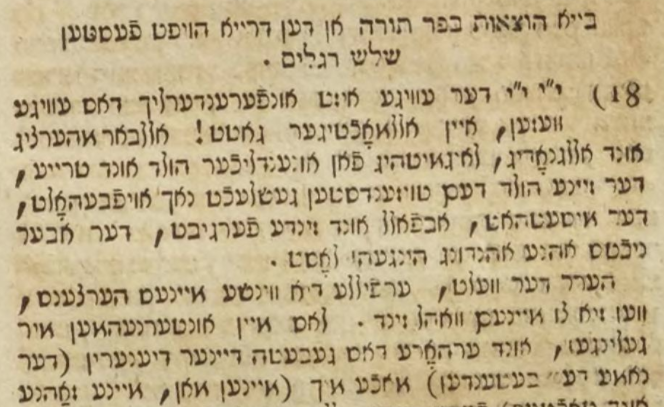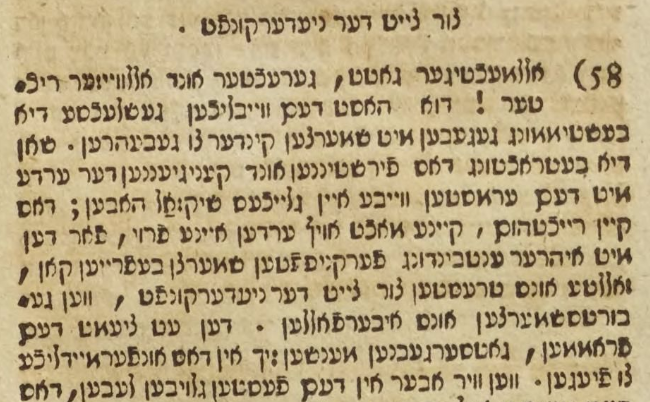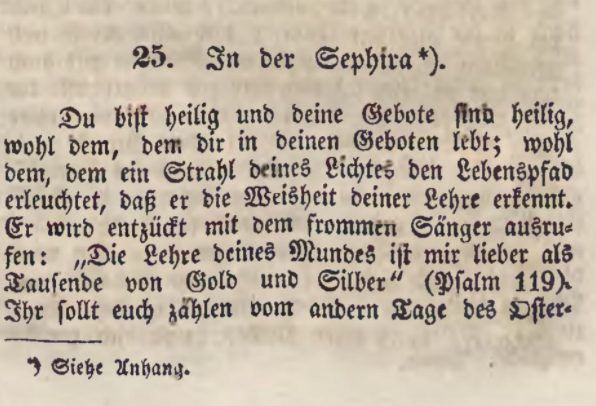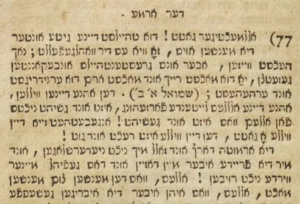TOGGLE COLUMNS (on/off):ADJUST COLUMN POSITIONS: select the column header cell and drag it where you want. show me!COPY INDIVIDUAL COLUMN(S): use CopyTables, a browser extension.
| Source (German) | Translation (English) |
|---|---|
Der Arme. |
The Pauper. |
Allmächtiger Gott! du theilst deine Güter unter die Menschen aus, so wie es dir wohlgefällt; nach höchst weisen, aber uns größtentheils unbekannten Gesetzen. Ja du machst reich und machst arm, du erniedrigst und erhöhest (1. Samuel 2, 7); denn ohne deinen Willen, ohne deine alles leitende Vorsehung ist und geschieht nichts von allem was ist und geschieht! Angebetet sei dein Wille, o Gott, denn dein Wille ist recht und gut! |
Almighty God, you distribute your goods among people as it pleases you, according to laws that are most wise but mostly unknown to us. Yes, you make rich and make poor, you humble and exalt (1 Samuel 2:7); for without your will, without your all-guiding providence, nothing at all happening happens! May your will be worshiped, O God, for your will is right and good! |
Die Armuth darf und soll mich nicht niederschlagen und mir die Freude über mein Dasein und das Gefühl meiner Würde nicht rauben! Alles, was den Menschen zum Menschen macht, alles, was ihn über die übrigen Geschäfte des Erdbodens erhebt, was ihm wahre und innere, bleibende Vollkommenheit verspricht und gewährt, das habe ich mit dem Reichsten meiner Brüder gemein. Ich habe ja eben dieselben Fähigkeiten, Kräfte, Aussichten und Hoffnungen die er hat; ich gehe ja mit ihm eben derselben Zukunft entgegen, die erst unser Schicksal entscheiden wird, und zu welcher wir uns beide hier vorbereiten sollen. Ich darf ja nicht denken, daß er mich deßwegen, weil ich arm bin, weniger liebt, oder daß mich die Armuth hindern würde, meine Bestimmung zu erreichen. |
Poverty must not and shall not knock me down and rob me of the joy of my existence and the feeling of my dignity! Everything that makes a person a person, everything that raises them above the rest of the business of the earth, that promises and grants them true and inner, lasting perfection, that I have in common with the richest of my fellows. I have the same abilities, powers, prospects and hopes that they have; I am going with them towards the same future that will decide our fate and for which we are both to prepare ourselves here. I must not think that they love me less because I am poor, or that poverty would prevent me from reaching my destiny. |
Vielleicht versagte mir deine väterliche Liebe, o Gott, den Reichthum, weil er mir vielleicht zum Fallstrick und zum Verderben gereichen würde. — Unverschuldet ist meine Armuth, und diese kann nicht schänden. Gottes Urtheil, der allein gerecht richtet, wird nicht von meiner Armuth bestimmt, und die Achtung solcher Menschen, die überall nur auf den äußern Zustand, auf das Kleid des Menschen sieht, hat keinen Werth. Verleihe mir nur, o Gott, daß ich von den Fehlern und Vergehungen rein bleibe, die meinem Stande mehr als andern eigen sind, und wozu der Arme die stärksten Verfuchungen und Reizungen findet. Fern sei von mir irgend ein unrechtmäßiges Mittel, mich der Armuth zu entreißen und mir Reichthum zu erwerben! dann würde meine Gewissensruhe dahin, und die Achtung aller Rechtschaffenen, und das Wohlgefallen Gottes für mich verloren sein! dann würde ich die Verachtung und die Schande wirklich verdienen, die jetzt nur nach einer falschen Einbildung, oder nach dem Urtheil des Thoren auf mir lasten. Fern sei es von mir, mürrisch zu klagen über die Schickungen Gottes, der Ewige ist gerecht in allen seinen Wegen, und fromm in all seinem Thun. Fern sei von mir Neid, Verachtung und Spott gegen die Reichen. Fern sei es von mir, mich je der Muthlosigkeit zu überlassen, und für die Zukunft ängstlich zu sorgen. Gelobt sei der Ewige Tag für Tag, dies sei mein Wahlspruch. |
Perhaps your paternal love, O God, denied me wealth, because it would perhaps be a snare and ruin for me. — My poverty is not my fault, and it cannot disgrace me. God’s judgment, who alone judges justly, is not determined by my poverty, and the respect of such people, who everywhere only look at the outer condition, at the dress of man, has no value. Only grant me, O God, that I may remain pure from the faults and transgressions which are more peculiar to my condition than to others, and to which the poor find the strongest temptations and irritations. Far be it from me to use any unlawful means to wrest myself from poverty and to acquire wealth! Then my peace of conscience would be gone, and the esteem of all the righteous and the good pleasure of God would be lost to me! Then I would really deserve the contempt and disgrace that now weigh upon me only according to a false imagination, or according to the judgment of fools. Far be it from me to complain sullenly about the fates of God; the Eternal is just in all his ways, and pious in all his doings. Far be it from me to envy, despise, and mock the rich. Far be it from me ever to abandon myself to despondency and to worry about the future. Praise be to the Eternal Day by day, this is my motto. |
Das Wort deiner heiligen Schrift sei mein Trost: „Ehrfürchter Gott, ihr seine Heiligen! seine Verehrer haben keinen Mangel. Junge Löwen darben und hungern, aber den Gottesverehrern fehlt kein Gut” (Psalms 34, 10-11). „Ich bin jung gewesen, bin alt geworden, und habe nie den Gerechten verlassen und seine Kinder nach Brod gehen sehn” (Psalms 37, 25). Nur auf jene Welt sei mein Blick gerichtet! Wo der Reiche den Armen, der Vornehme den Geringen nicht mehr verdrängen, nicht mehr drücken, nicht mehr verdunkeln kann; wo ein jeder nach dem was er ist und was er gethan, nicht aber nach dem was er gehabt und zu sein schien, von dir, dem Richter der Welt, dem Vater aller Menschen, wird beurtheilt und des Lohnes oder der Strafe würdig erkannt werden! Dort gelten ganz andere Schätze und Reichthümer als hier! Schätze und Reichthümer die ewig dauern, und zu denen dem Armen wie dem Reichen der Zugang offen steht. Laß mich reich werden, o Gott, an unvergänglichen Gütern, an geistiger, immer zunehmender Vollkommenheit, das ist alles, o Gott, was ich unbedingt und mit völliger Ueberzeugung, daß es für mich gut sei, von dir bitte, und das wirst du, Allgütiger, mir gewiß nicht versagen! In allem übrigen unterwerfe ich mich in tiefster Ergebung deinem heiligen Willen; du bist ein verborgener Gott, der Retter und Helfer Israels. Beschämt werden die allesammt und müssen erröthen, die sich Götzenbilder erkünsteln, Israel aber wird vom Ewigen gerettet. Amen. |
Let the word of your holy scripture be my comfort: “Revere God, you his holy ones! his worshipers have no want. Young lions starve and go hungry, but God’s worshipers shall not lack any good” (Psalms 34:10-11). “I have been young, I have grown old, I have never forsaken the righteous, nor seen their children seek after bread” (Psalms 37:25). Only to that world may my gaze be directed! Where the rich can no longer suppress the poor, the noble the lowly, no longer repress them, no longer darken them; where everyone will be judged by you, the judge of the world, the father of all men, according to what they are and what they have done, but not according to what they have and seemed to be, and [only then] will be found worthy of reward or punishment! There are quite different treasures and riches than here! Treasures and riches that last forever, and to which the poor as well as the rich have access. Let me become rich, O God, in imperishable goods, in spiritual, ever-increasing perfection, that is all, O God, what I ask of you unconditionally and with complete conviction that it is good for me, and that you, All-Good One, will certainly not deny me! In all other respects I submit in deepest surrender to your holy will; you are a hidden God, the savior and helper of Israel. They will be ashamed of everything and will have to blush, those who make idols for themselves, but Israel will be saved by the Eternal. Amen. |
“Der Arme” was translated/adapted by Yehoshua Heshil Miro and published in his anthology of teḥinot, בית יעקב (Beit Yaaqov) Allgemeines Gebetbuch für gebildete Frauen mosaischer Religion. It first appears in the 1829 edition, תחנות Teḥinot ein Gebetbuch für gebildete Frauenzimmer mosaischer Religion as teḥinah №77 on pp. 117-119. In the 1835 edition, it appears as teḥinah №78 on pp. 141-144. In the 1842 edition, it appears as teḥinah №81 on pp. 146-149.
We welcome corrections and improvements. The transcription of the German from Latin script in Fraktur type provided machine-readable text for a machine translation by DeepL, which we then edited for accuracy and clarity. –Aharon Varady
Source(s)



“Der Arme | [Prayer of] the Pauper, a teḥinah by Yehoshua Heshil Miro (1829)” is shared through the Open Siddur Project with a Creative Commons Attribution-ShareAlike 4.0 International copyleft license.










Comments, Corrections, and Queries